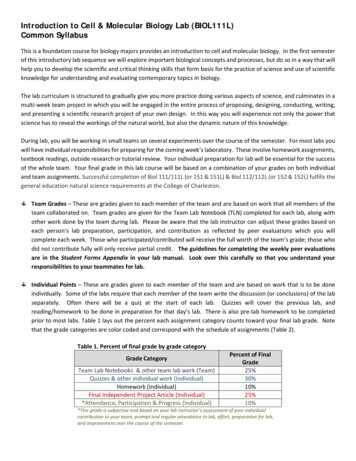
Transcription
Hydroxyurea forSickle Cell DiseaseTreatment Information from theAmerican Society of Hematology
About the American Society of HematologyFor more than 50 years, the American Society of Hematology (ASH) has been committed to helping hematologistsconquer blood diseases. With more than 17,000 members from nearly 100 countries, ASH is the world’s largestprofessional society of hematologists. We’re dedicated to furthering the understanding, diagnosis, treatment, andprevention of disorders affecting the blood. To learn about how ASH is working towards conquering sickle cell disease,visit www.hematology.org/scd.2
Table of ContentsIntroduction . . . . . . . . . . . . . . . . . . . . . . . . . . . . . . . . . . . . . . . . 4Sickle Cell Disease Basics . . . . . . . . . . . . . . . . . . . . . . . . . . . 4Hydroxyurea Facts . . . . . . . . . . . . . . . . . . . . . . . . . . . . . . . . . . . 5The Research on Hydroxyurea . . . . . . . . . . . . . . . . . . . . . . . . 8Safety and Side Effects . . . . . . . . . . . . . . . . . . . . . . . . . . . . . 10Taking Hydroxyurea . . . . . . . . . . . . . . . . . . . . . . . . . . . . . . . . 12The Next Step . . . . . . . . . . . . . . . . . . . . . . . . . . . . . . . . . . . . . . 14About This BookletThis booklet has been prepared by the American Society of Hematology and provides generalinformation about hydroxyurea, which is one of the few FDA-approved therapies to treat sickle celldisease. This booklet is purely an informational resource. It does not provide medical advice and isnot intended to substitute for consultation with a medical professional. People with sickle cell diseaseshould talk to their doctor before making any changes to their treatment.HYDROXYUREA PATIENT EDUCATION MATERIAL AMERICAN SOCIETY OF HEMATOLOGY3
IntroductionIf you have sickle cell disease, you know the impact it can haveon your life. Sickle cell disease can cause periods of intense pain(called “pain crises”) and other problems. You may even end upin the emergency room or the hospital.But here’s some good news: a medicine called hydroxyurea(“hi-drox-ee-ure-EE-a”) can help adults and children with sicklecell disease. This medicine can help you have fewer pain crises— and even live longer. Hydroxyurea has helped many people andit could help you.The American Society of Hematology developed this bookletto educate people with sickle cell disease about this importanttreatment option. We encourage you to talk with your doctorabout your personal treatment plan and whether hydroxyureacould help. The decision to take hydroxyurea is up to you.Sickle Cell Disease BasicsWhat is sickle cell disease?Sickle cell disease is a blood disease that causes problems with red blood cells.Normally, red blood cells are round and flexible, which allows them to move easily throughyour blood vessels. Red blood cells contain a protein called hemoglobin that carries oxygenthroughout your body.People with sickle cell disease don’t have regular hemoglobin in their red blood cells.Their hemoglobin can give their red blood cells a curved shape, like a banana or a sickle(a farming tool with a curved edge). These sickle cells are hard and sticky, which meansthey can block the flow of blood in your body and cause serious problems.Normal red blood cells4Sickle-shaped cellsCells blockingblood flow
What problems can sickle cell disease cause?Sickle cell disease can cause: Anemia – when you have fewer red blood cells to carryoxygen in your body, which can make you feel tired. Pain crisis — pain in your chest, stomach, or bones.This happens when sickle cells block your blood vessels. Acute chest syndrome — a lung problem that happens whensickle cells block the blood vessels in your lungs. This can belife threatening and you will need to go to the hospital. Organ damage — harm to important organs like your brain,heart, lungs, kidneys, and eyes. This can lead to seriousproblems like kidney failure or vision loss.Sickle cell disease can even shorten your life — but hydroxyurea canhelp you live longer. That’s why it’s important to consider taking it.Hydroxyurea FactsHydroxyurea is a medicine that doctors have used to treat peoplewith sickle cell disease since the 1980s. The Food and DrugAdministration (FDA) approved it for treating adults with sickle celldisease in 1998. In 2017, the FDA approved it to treat children withsickle cell disease.Hydroxyurea canhelp people withsickle cell diseaselive longer.Hydroxyurea is also used to treat cancer. But doctors use a lowerdose (amount) to treat sickle cell disease than to treat cancer.HYDROXYUREA PATIENT EDUCATION MATERIAL AMERICAN SOCIETY OF HEMATOLOGY5
How can hydroxyurea help with sickle cell disease?Hydroxyurea reduces the problems that sickle cell disease causes. People with sicklecell disease who take hydroxyurea have fewer: Pain crises Episodes of acute chest syndrome Blood transfusions Hospital staysHydroxyurea can also prevent or slow down damage to your organs.Cole’s Story *“This was my first activity without pain in years.”Before Cole started taking hydroxyurea, she had frequent pain crises.For a while, she was in the hospital every few weeks. She wasn’t ableto keep a job.Then Cole’s doctor recommended hydroxyurea. After she started takingit, Cole began to feel better. She even walked a 5K race just a few monthslater without going into crisis or having any pain. She was able to start workingagain — and she has gone more than 4 years without a major pain crisis.*The stories in this booklet are from real people who shared their experiences with ASH.How does hydroxyurea work?Hydroxyurea makes your red blood cells bigger. It helps them stay rounder and more flexible —and makes them less likely to turn into a sickle shape.The medicine does this by increasing a special kind of hemoglobin called hemoglobin F.Hemoglobin F is also called fetal hemoglobin because newborn babies have it. When you havehigher levels of hemoglobin F, your red blood cells are less likely to cause problems.Sickle-shaped cellsNormal, round red blood cellsUse of hydroxyureaover time6
Who should take hydroxyurea?If you have any form of sickle cell disease, hydroxyurea could help you.This is true even if your symptoms aren’t severe.Different types of sickle cell disease respond to hydroxyureadifferently. If you aren’t sure which type of sickle cell disease you have,ask your doctor — and say that you’d like to know how hydroxyureacould help you.Hydroxyurea caneven help peoplewho rarely haveobvious problemscaused by sicklecell disease. Experts strongly recommend hydroxyurea for people with sicklecell disease type SS or type sickle beta zero (Sβ0)thalassemia (“thal-uh-SEE-me-uh”). Hydroxyurea is proven tohelp people with both of these forms of sickle cell disease. If you have sickle cell disease type SC or type sickle betaplus (Sβ ) thalassemia, talk to your doctor. Hydroxyureacan help, but scientists have done less research on whathydroxyurea can do for people with these types of sicklecell disease.What are the types of sickle cell disease?There are many different forms of sickle cell disease: Sickle cell anemia, which includes sickle cell disease type SS and type sickle beta zero(Sβ0) thalassemia Sickle cell disease type SC Sickle cell disease type sickle beta plus (Sβ ) thalassemia Sickle cell disease type SD, SE, and other sickle cell disease variantsHYDROXYUREA PATIENT EDUCATION MATERIAL AMERICAN SOCIETY OF HEMATOLOGY7
The Research on HydroxyureaResearch shows that hydroxyurea is safe and helpful forpeople with sickle cell disease.The Multicenter Study of HydroxyureaIn 1992, scientists started a study of 299 people to seeif hydroxyurea could help adults with these kinds of sicklecell disease: Sickle cell disease type SS Sickle cell disease type sickle beta zero(Sβ0) thalassemiaTo do this, they randomly put people in the study into 2groups. One group got hydroxyurea. The other group got aplacebo (a pill that has no medicine). The people in the studydidn’t know which pill they were taking.What did the study show?The people who took hydroxyurea had fewer problemscaused by their sickle cell disease.4.52.5They had half as many pain crises. The people who took the placebo hadnearly 5 pain crises in a year.4.5 pain crisesper year withthe placebo2.5 pain crisesper year withhydroxyurea The people who took hydroxyurea had abouthalf as many — fewer than 3 pain crises a year.2.41They had fewer hospital stays. People who took the placebo had morethan 2 hospital stays a year due to pain crises. People who took hydroxyurea had only 1hospital stay a year because of a pain crisis.82.4 hospital staysper year withthe placebo1 hospital stayper year withhydroxyurea
They got acute chest syndrome less often. 35 out of every 100 people who took the placebogot acute chest syndrome. Only 16 out of every 100 people who took hydroxyureagot acute chest syndrome — that’s about half as many.351635 of 100 people gotacute chest syndromewith the placebo16 of 100 people got acutechest syndrome withhydroxyureaThey needed fewer blood transfusions. 50 out of every 100 people who took the placebogot transfusions. Just 32 out of every 100 people who tookhydroxyurea got transfusions.5032They didn’t have more side effects.The researchers also looked at side effects and foundthat people taking hydroxyurea didn’t have any more sideeffects than people taking the placebo.50 of 100 people gottransfusions withthe placebo32 of 100 people gottransfusions withhydroxyureaSource: Charache, S., Terrin, M. L., Moore, R. D., Dover, G. J., Barton, F. B., Eckert, S. V., McMahon, R. P., and Bonds,D. R. (1995). Effect of hydroxyurea on the frequency of painful crises in sickle cell anemia, The New EnglandJournal of Medicine, 332(20), 1317-1322. http://doi.org/10.1056/NEJM199505183322001What have other studies shown?Many other studies have shown that hydroxyurea helps people with sickle celldisease — even children. One study showed that hydroxyurea is helpful andsafe for children as young as 9 months old.HYDROXYUREA PATIENT EDUCATION MATERIAL AMERICAN SOCIETY OF HEMATOLOGY9
Safety and Side EffectsIs it safe to take hydroxyurea for many years?Yes. Many people with sickle cell disease have taken hydroxyureasafely for over 20 years. Even young children can take it.Does hydroxyurea cause cancer?No. There’s no evidence that hydroxyurea causes cancer in peoplewith sickle cell disease. It’s been used safely since the 1980s.Nana’s Story*“Hydroxyurea has given me the opportunity to be in controlof my health and life.”Nana started taking hydroxyurea when she was just 12 years old.She’d already been in the hospital many times. After Nana started takinghydroxyurea, she was in the hospital less and less. She even got near perfectattendance at school — and went on to study psychology at the University of Virginia.*The stories in this booklet are from real people who shared their experiences with ASH.What side effects can hydroxyurea cause?All medicines can have side effects. Some people who takehydroxyurea may experience these side effects: Thinning hair or mild hair loss Fingernail beds that turn darker Nausea (feeling sick to your stomach)Very rarely, hydroxyurea can cause more serious side effects. Butmost people with sickle cell disease who take hydroxyurea don’thave any serious side effects.If you have any new symptoms after you start taking hydroxyurea,tell your doctor — you may be able to take a lower dose.10Most peoplewith sickle celldisease who takehydroxyurea havefew or no sideeffects. Most sideeffects are mild.
Will I be able to start a family?If you’re thinking about having a baby, be sure to talk to your doctor aboutthe pros and cons of taking hydroxyurea. Experts are still learning abouthow hydroxyurea affects your ability to have a healthy baby. Taking it duringpregnancy is a personal choice that your doctor can help you make.Women If you are pregnant or planning to get pregnant, talk to your doctor tomake a plan.Many men andwomen who havetaken hydroxyureahave had healthybabies. Hydroxyurea may increase the risk of birth defects, but we don’t knowfor sure yet. Some women choose to stop taking hydroxyurea early in their pregnancyand then start it again during the third trimester (after 29 weeks).Men Hydroxyurea can lower your sperm count, which may already be lowdue to sickle cell disease. Painful erections are a complication of sickle cell disease that cancause permanent damage to the penis. Hydroxyurea may makethese painful erections less likely.Nikita’s Story*“My baby is perfectly healthy and doing just fine.”Nikita started taking hydroxyurea after she got sick during a business trip,and it helped her a lot. After taking it for over 5 years, Nikita got pregnant.She talked to her doctor about continuing to take hydroxyurea, and together they decided the bestchoice for her and the baby was to stop taking it during her pregnancy. After she gave birth to a healthybaby boy, Nikita started taking hydroxyurea again. Now, both she and her son are doing well.*The stories in this booklet are from real people who shared their experiences with ASH.HYDROXYUREA PATIENT EDUCATION MATERIAL AMERICAN SOCIETY OF HEMATOLOGY11
Taking HydroxyureaWhat do I need to know abouttaking hydroxyurea? Most people take hydroxyurea pills once a day. Your doctor willprescribe the dose he or she thinks is right for you. Sometimes youmay need to take a different number of pills on certain days. Hydroxyurea is safe to take with most other medicines — but it’salways a good idea to check with your doctor or pharmacist beforestarting a new medicine.Hydroxyurea isn’tvery expensive,and most healthinsurance planscover it.Actual size of samplehydroxyurea pill Hydroxyurea pills are capsules that are about three-quarters(3/4) of an inch long.1 inchChecking your blood countYou’ll need to get your blood cell counts checked regularly when you takehydroxyurea. When you first start taking it, you may need to get your bloodcounts checked every month.Ask your doctor about your blood count numbers to see how they change.The changes in your blood counts can be a good sign that the hydroxyureais working!When takinghydroxyurea, gettingregular blood countshelps your doctor seehow the medicineis working.These tests will check for: Hemoglobin, the protein that carries oxygen in red blood cells. Hydroxyurea works by makingyour hemoglobin level go up. The size of your red blood cells (measured as “mean cell volume,” or MCV). Hydroxyureaworks by making your red blood cells bigger. Neutrophils, a type of white blood cell. Hydroxyurea makes the number of neutrophils go down.This is okay as long as your white blood cell count doesn’t get too low.Your doctor might change your dose based on your blood cell counts. For example, if the neutrophils inyour blood don’t go down, your doctor might increase your dose.Your doctor will also check to see if some types of blood cells get too low. If this is the case, yourdoctor might ask you to stop taking hydroxyurea for a while.12
What if I miss a dose? Hydroxyurea will only work if you take it every day. Missing a dose is not dangerous and will not reversethe benefits of the drug.Remember to take it every dayIt can be hard to remember to take hydroxyurea every day. Here are some tips to help you remember:Mark your calendarevery day after youtake it.Get a pill box with asection for each day ofthe week. Fill it on thesame day every week.Set an alarm on yourcell phone that goesoff every day.Ask friends orfamily members tohelp remind you.Ndiogou’s Story*“Talk to your doctor about giving it a try.”Ndiogou started taking hydroxyurea when he was 21 years old andnoticed the difference a few months later. At first, he had a lot lesspain. Eventually, it went away completely.Sickle cell disease hadn’t stopped Ndiogou from playing sports or takingpart in other activities, and taking hydroxyurea made life easier for him.*The stories in this booklet are from real people who shared their experiences with ASH.HYDROXYUREA PATIENT EDUCATION MATERIAL AMERICAN SOCIETY OF HEMATOLOGY13
What if I take hydroxyurea and it doesn’t seem to help? Don’t be discouraged! Hydroxyurea takes time to work. Try tostick with it for at least a year. It may take that long for yourdoctor to figure out the right dose for you. If you’re having side effects, don’t stop taking hydroxyurea —talk to your doctor first. Some side effects will go away after youtake it for a while.Adrienne’s Story*“It took a while to start working, but I feel much better now.”For a while, Adrienne was very sick and her blood counts were alwayslow. Her doctor prescribed hydroxyurea for her sickle cell disease, but shestopped taking it after 4 months because she was worried about side effects.When her doctor explained how hydroxyurea could help her over time, Adriennedecided to try it again. She started to feel better after about 6 months. Now she’s ableto be more active and she’s been in the hospital a lot less, too!*The stories in this booklet are from real people who shared their experiences with ASH.The Next StepHydroxyurea can help people with sickle cell disease have fewer pain crises and better health.If you have sickle cell disease, it could help you. We hope this booklet has answered some ofyour questions about this treatment option.Think hydroxyurea might be right for you? Start the conversation with your doctor.14
NotesHYDROXYUREA PATIENT EDUCATION MATERIAL AMERICAN SOCIETY OF HEMATOLOGY15
the placebo 16 of 100 people got acute chest syndrome with hydroxyurea 32 of 100 people got transfusions with hydroxyurea. 10 Safety and Side Effects Is it safe to take hydroxyurea for many years? Yes. Many people with sickle cell disease have taken hydroxyurea safely for over 20 years. Even young children can take it.










